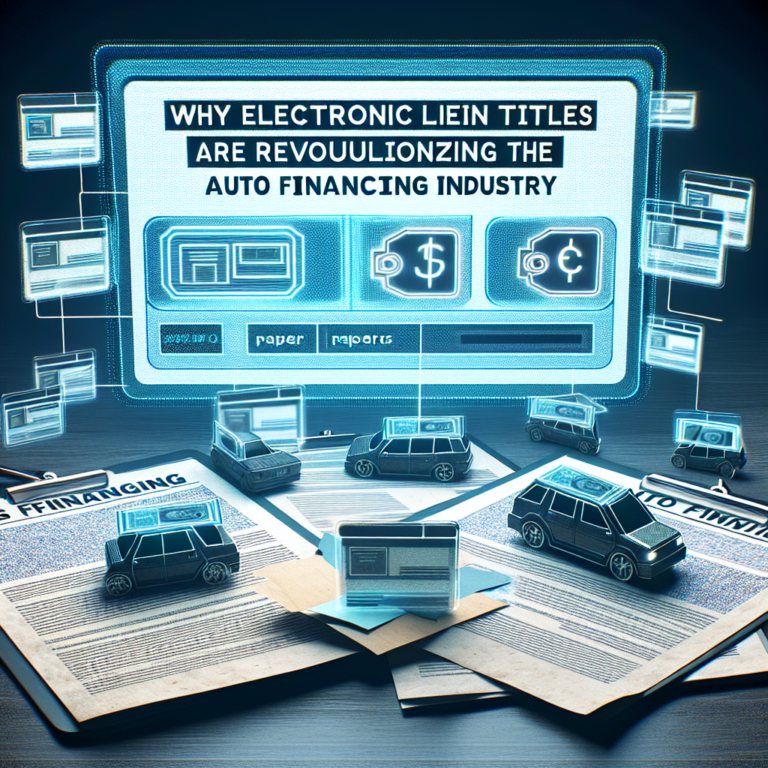Why Electronic Lien Titles Are Revolutionizing the Auto Financing Industry
In recent years, the automotive financing sector has seen significant changes driven by technological advancements. One of the most impactful developments has been the adoption of Electronic Lien and Title (ELT) systems. Traditionally, lien titles have been paper-based documents that record the financial interest of a lender in a vehicle. With the transition to electronic systems, the auto financing industry is experiencing a transformation that impacts lenders, consumers, and the overall efficiency of the vehicle registration process.
Understanding Electronic Lien Titles
An Electronic Lien Title system integrates the lien management process into digital format, replacing the cumbersome paper-based documentation system. When a vehicle is financed, the lender files an electronic lien with the state Department of Motor Vehicles (DMV) or equivalent authority, creating a digital record of the lien. This system allows lenders to manage their claims efficiently, ensuring that they can quickly access and alter lien information as necessary.
Enhancing Efficiency and Reducing Costs
The transition to electronic lien titles has led to significant operational efficiencies for lenders and state agencies. With paper titles, the process of filing, retrieving, and managing records was often time-consuming and prone to errors due to manual data entry. The ELT system streamlines this process by automating title management, reducing the need for physical storage, and minimizing the likelihood of clerical errors.
For lenders, this means decreased administrative costs and faster processing times. Transactions that once took weeks to finalize can now often be completed in days, or even hours. Additionally, the reduction in paper usage and storage requirements allows financial institutions to allocate resources more effectively, further enhancing profitability.
Improved Security and Reduced Fraud
One of the most compelling advantages of Electronic Lien Titles is the heightened level of security they offer. Paper titles can be easily forged or altered, leading to instances of fraud that burden both lenders and consumers alike. The electronic system mitigates these risks through encrypted data, secure access protocols, and stringent auditing processes.
By digitizing the lien process, lenders can maintain a more transparent and accurate view of their portfolios. ELTs help ensure that only authorized users can access specific information, reducing the potential for fraudulent activities. Additionally, the digital format allows for real-time updates, making it easier to track ownership changes and lien releases.
Streamlined Consumer Experiences
The impact of Electronic Lien Titles extends beyond lenders and regulators; consumers also benefit from this technological shift. In traditional systems, waiting for a paper title to be processed and mailed can be a tedious experience. The electronic system enables quicker releases of titles once loans are paid off, allowing consumers to transfer ownership with minimal hassle.
Moreover, consumers feel more secure knowing that their vehicle title is protected against theft or loss. The digital nature of ELTs means that owners can access their title information online, check the status of their lien, and ensure that the information is accurate—all adding to a more user-friendly experience.
Facilitating the Growth of the Used Car Market
Another significant impact of Electronic Lien Titles is their contribution to the growth of the used car market. The ability to quickly verify the status of a vehicle’s title and any existing liens strengthens consumer confidence and expedites transactions. Buyers are less likely to shy away from used vehicles when they can quickly ascertain the vehicle’s history and lien status.
By eliminating the delays associated with paper titles, the used car market thrives—sellers can transact more quickly, and buyers can take possession of their vehicles sooner, all of which creates a more fluid marketplace.
Conclusion
Electronic Lien Titles are undoubtedly revolutionizing the auto financing industry by introducing increased efficiency, enhanced security, better consumer experiences, and fostering a vibrant used car market. As the industry continues to embrace technology, it’s clear that the shift towards ELT systems is not just a trend; it represents a fundamental change in how the automotive finance ecosystem operates.
With ongoing innovations and the potential for further integration into vehicle registration and financing processes, Electronic Lien Titles are paving the way for a future that is not only secured and efficient but also more accessible for everyone involved. The shift towards a digital framework signifies a new era in auto financing, setting the stage for even greater advancements in the years to come.


